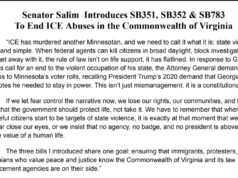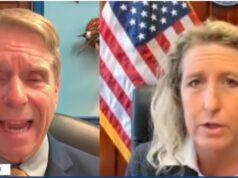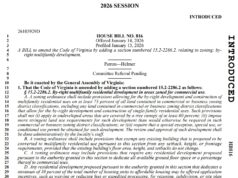The criminal justice and court systems—nationally and in Virginia—are known to suffer from racial inequities. These systems have disproportionately harmed communities of color. Governor Northam has stated that he wants to spend his tenure remedying racial inequities in the Commonwealth. He has promised bold, sweeping criminal justice reform, saying “he wants Virginia to approach criminal justice with compassion, fairness and mercy.” He has done a good job of using his bully pulpit to push for legislative changes such as marijuana legalization, increasing the felony larceny rate, and ending driver’s license suspensions. But he has additional executive tools at his disposal, granted in the Virginia Constitution: “to remit fines and penalties…to grant reprieves and pardons after conviction…to remove political disabilities [restore rights]…and to commute capital punishment.”
Several governors have recently used their clemency powers in bold ways. Governor McAuliffe’s hallmark moment was boldly using these clemency tools to restore voting rights to over 200,000 Virginians. Governor Northam has an opportunity here as well, to meet his commitment to reduce mass incarceration, improve the equity in the criminal justice system, help give returning citizens a better chance at success, and simply show mercy to those caught up in this system. Below is a starting list of ideas for ways he could use his clemency tools to take such bold action. They are roughly sorted by how bold they would be coming from this Administration, how heavy a political lift, so to speak, for Virginia.
Definitions:
Simple pardon – a statement from the Governor that constitutes forgiveness, signifies the person is rehabilitated. The individual remains guilty, and the record is not expunged, but a notification is added indicating the pardon, which helps with employment and education. Currently these are granted after review of an application by the Secretary of the Commonwealth. A dedicated additional staff member would be helpful to getting this system working more efficiently. (Note that if Virginia makes bold reforms to its expungement laws, this becomes no longer necessary, but Northam shouldn’t wait.)
Conditional pardon – the individual remains guilty, but the sentence can be commuted, or the individual can be otherwise released from prison with specified conditions, such as transfer to a secure mental health facility.
Absolute pardon – the individual is not guilty and the record is expunged.
Commute sentence – partially or totally reduce sentence (can include release if new sentence already completed)
Rights restoration – not a pardon, but an act of executive clemency (note that gun rights restoration must be separately petitioned from the courts after restoration of political rights)
Good:
- Simple pardon of everyone convicted of marijuana possession
- Simple pardon of everyone convicted of a nonviolent crime, who has been out for at least X years (Northam could choose an appropriate number, perhaps 5 years) without re-offending
- Pardon all minors convicted of prostitution (Note: why is this even a crime? Shouldn’t the minor here be a victim of statutory rape?)
- Absolute pardon of everyone convicted under a law that has been found unconstitutional (i.e. habitual drunkness, consensual sodomy, etc.)
- Commute felony larceny sentences between $200 and $1000 since 2000 down to a misdemeanor sentence
- Restore voting rights for those who have completed their sentence (including probation), but have outstanding fines and fees
- Conditional pardon (with transfer to secure mental health facility) for those serving long sentences, who suffer from serious mental illness that was an issue at the time of the crime. (For example, Vince Gilmer, Christopher Sharikas)
- Absolute pardon of those convicted who’ve completed their sentence and have a strong innocence claim. (For example, Darnell Phillips)
- Standard gubernatorial pardons for those convicted and serving time who have strong innocence claims or extreme disproportionate sentences (For example, Ivan Teleguz and Justin Wolfe. Technically, the Administration has an unofficial rule of only considering such pardons to those who have plead not guilty, which would exclude Justin, who plead guilty to avoid a death sentence. Considering how frequently people take a plea under threat of harsher sentences, this rule seems ill-conceived.)
Better:
- Commute sentence of everyone serving time for any marijuana-related offense (includes dealing)
- Simple pardon of everyone convicted of a nonviolent crime plus all misdemeanors, who has been out for at least X years (Northam could choose an appropriate number) without re-offending
- Simple pardon of everyone convicted of a nonviolent crime, who has been out at least X years with nothing more than technical parole/probation violations (behavior that violates a condition of probation that is not otherwise a crime)
- Simple pardon of all those convicted of prostitution
- Restore voting rights to everyone on parole or probation
- Restore voting rights to everyone currently incarcerated for (some specified subset of) felonies
- Remit all fines and fees for those who are indigent
- Commute both remaining death sentences to life
Best:
- Simple pardon of everyone convicted of any marijuana-related offense (plus commutation)
- Simple pardon of everyone convicted of a nonviolent crime, plus all misdemeanors, and (some specified subset of) violent felonies who has been out at least X years without re-offending and/or only technical parole/probation violations
- Restore voting rights to everyone
- Commute remainder of sentence of anyone who has served more than X years for a nonviolent drug crime (could exclude dealing to minors)
This is not an all-inclusive list; for the strongest of criminal justice reform advocates, much more could be done. But given Virginia’s political ideology, some of these would already be politically difficult. Despite documented inequities in the length of sentences, commuting sentences is undoubtedly more difficult, as it means the Governor substituting his own judgement for that of the jury. Issuing simple pardons is less controversial, and makes it easier for those who have completed their sentence to get jobs, educational opportunities, housing, and avoid recidivism–this is an important tool in my opinion, even if it falls short of complete records expungement. Interestingly, legislation this year by Republican senators to allow records expungement following a simple pardon passed the Senate unanimously before being left in the House Courts of Justice Committee. Expungement reform will hopefully be a top priority next session, but people’s lives are hurt every day we wait. The best way to end mass incarceration and to simultaneously keep crime rates down is to ensure that people leave prison better-equipped to rejoin communities, with the right tools and without a permanent scarlet letter.











